Foundations of Business Law Assignment: Term 2, 2019
VerifiedAdded on 2022/11/07
|10
|2543
|415
Homework Assignment
AI Summary
This document presents a comprehensive solution to a Business Law assignment, addressing key legal concepts and principles. The assignment analyzes several case studies, including Ford & Anor v La Forrest, focusing on contract formation, the validity of electronic contracts, and the application of the Electronic Transactions Act 1999. The document examines essential elements of a valid contract, such as offer, acceptance, intention to create legal relations, and consideration. It further explores scenarios involving breach of contract, fraudulent activities, and the application of the Australian Consumer Law, particularly concerning misleading conduct and consumer rights. The solution provides a detailed IRAC (Issue, Rule, Analysis, Conclusion) framework, offering a structured approach to legal problem-solving and demonstrating how legal principles are applied to real-world business situations. The document also discusses the implications of court decisions on businesses and provides a thorough examination of relevant legal issues to help students understand business law.
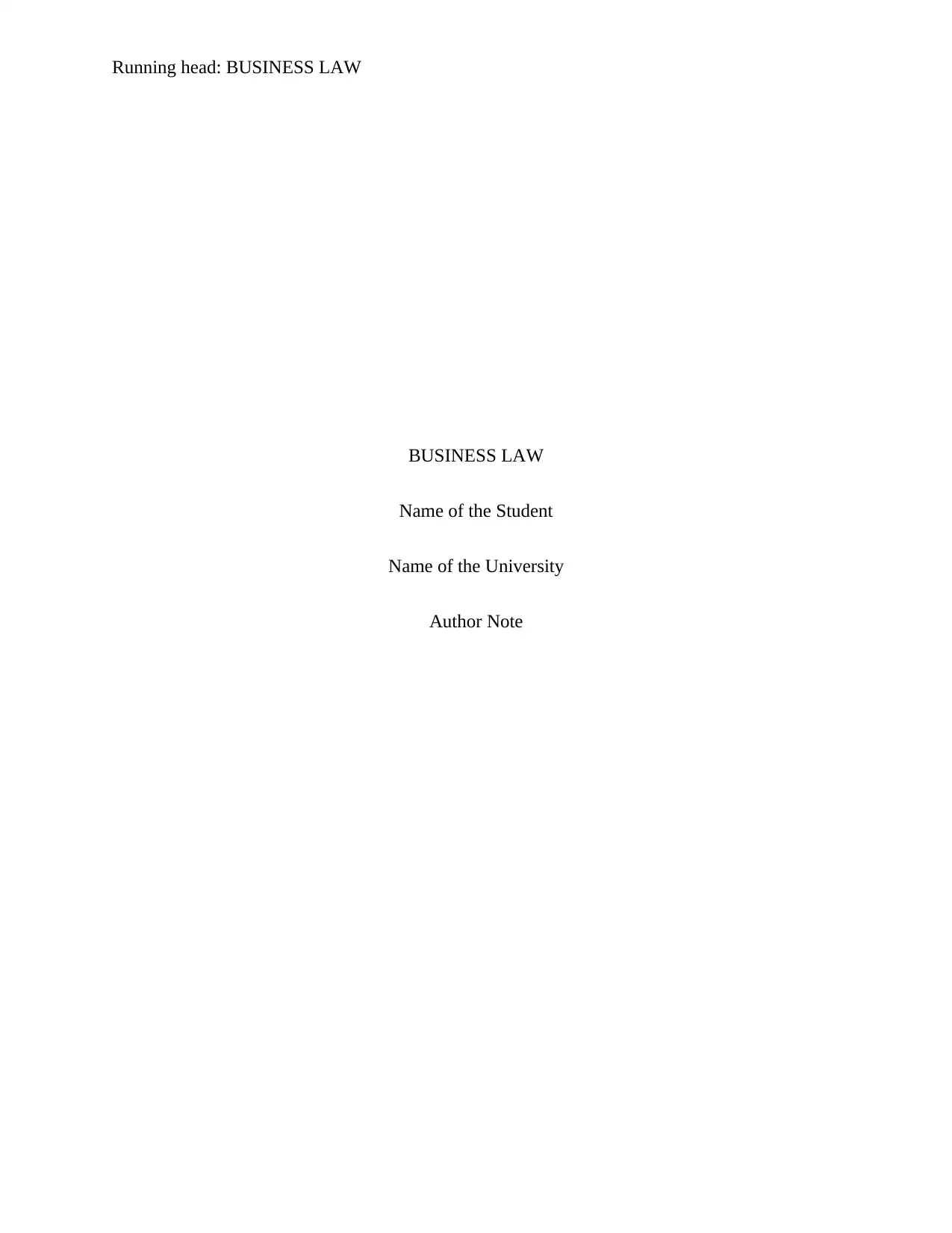
Running head: BUSINESS LAW
BUSINESS LAW
Name of the Student
Name of the University
Author Note
BUSINESS LAW
Name of the Student
Name of the University
Author Note
Paraphrase This Document
Need a fresh take? Get an instant paraphrase of this document with our AI Paraphraser
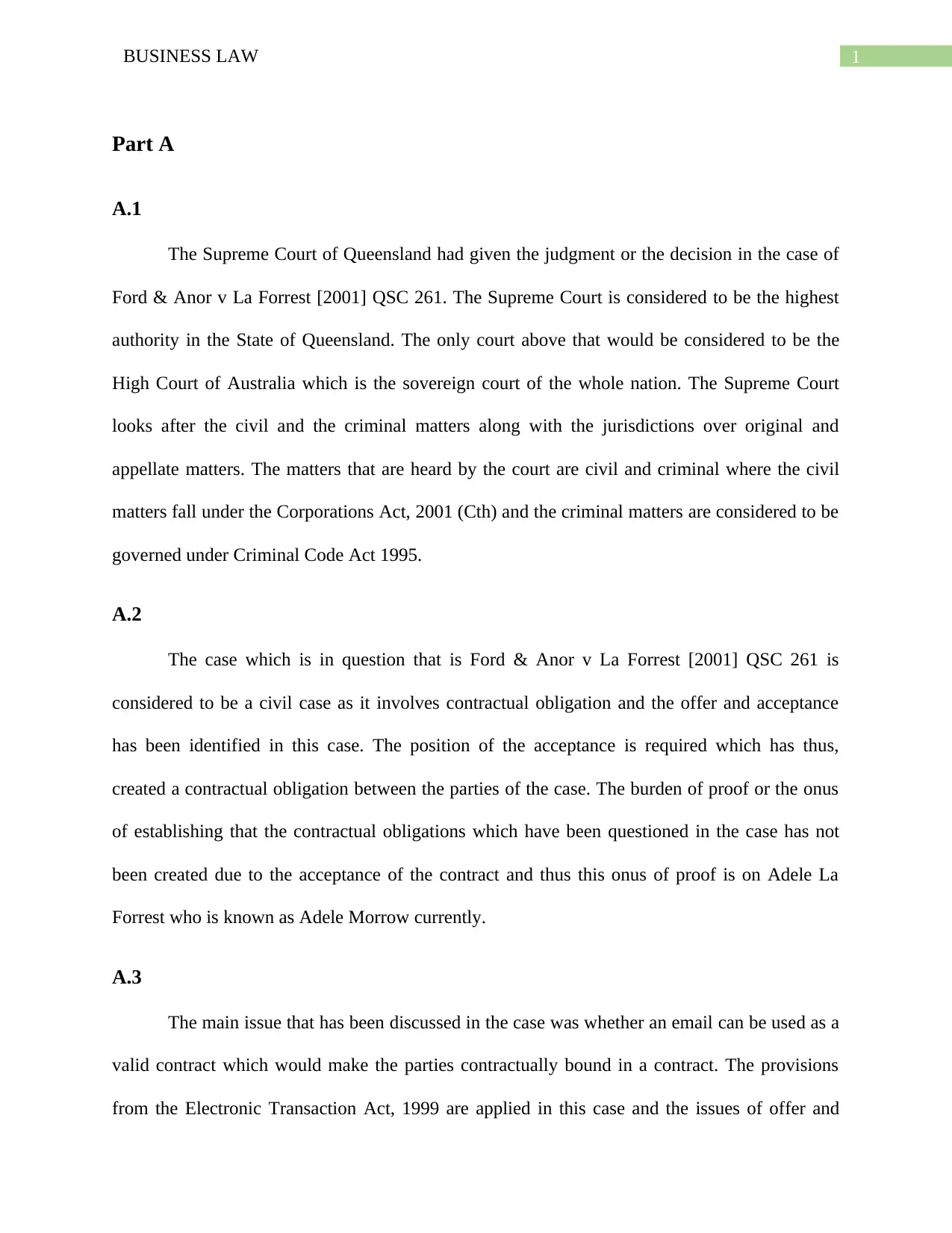
1BUSINESS LAW
Part A
A.1
The Supreme Court of Queensland had given the judgment or the decision in the case of
Ford & Anor v La Forrest [2001] QSC 261. The Supreme Court is considered to be the highest
authority in the State of Queensland. The only court above that would be considered to be the
High Court of Australia which is the sovereign court of the whole nation. The Supreme Court
looks after the civil and the criminal matters along with the jurisdictions over original and
appellate matters. The matters that are heard by the court are civil and criminal where the civil
matters fall under the Corporations Act, 2001 (Cth) and the criminal matters are considered to be
governed under Criminal Code Act 1995.
A.2
The case which is in question that is Ford & Anor v La Forrest [2001] QSC 261 is
considered to be a civil case as it involves contractual obligation and the offer and acceptance
has been identified in this case. The position of the acceptance is required which has thus,
created a contractual obligation between the parties of the case. The burden of proof or the onus
of establishing that the contractual obligations which have been questioned in the case has not
been created due to the acceptance of the contract and thus this onus of proof is on Adele La
Forrest who is known as Adele Morrow currently.
A.3
The main issue that has been discussed in the case was whether an email can be used as a
valid contract which would make the parties contractually bound in a contract. The provisions
from the Electronic Transaction Act, 1999 are applied in this case and the issues of offer and
Part A
A.1
The Supreme Court of Queensland had given the judgment or the decision in the case of
Ford & Anor v La Forrest [2001] QSC 261. The Supreme Court is considered to be the highest
authority in the State of Queensland. The only court above that would be considered to be the
High Court of Australia which is the sovereign court of the whole nation. The Supreme Court
looks after the civil and the criminal matters along with the jurisdictions over original and
appellate matters. The matters that are heard by the court are civil and criminal where the civil
matters fall under the Corporations Act, 2001 (Cth) and the criminal matters are considered to be
governed under Criminal Code Act 1995.
A.2
The case which is in question that is Ford & Anor v La Forrest [2001] QSC 261 is
considered to be a civil case as it involves contractual obligation and the offer and acceptance
has been identified in this case. The position of the acceptance is required which has thus,
created a contractual obligation between the parties of the case. The burden of proof or the onus
of establishing that the contractual obligations which have been questioned in the case has not
been created due to the acceptance of the contract and thus this onus of proof is on Adele La
Forrest who is known as Adele Morrow currently.
A.3
The main issue that has been discussed in the case was whether an email can be used as a
valid contract which would make the parties contractually bound in a contract. The provisions
from the Electronic Transaction Act, 1999 are applied in this case and the issues of offer and
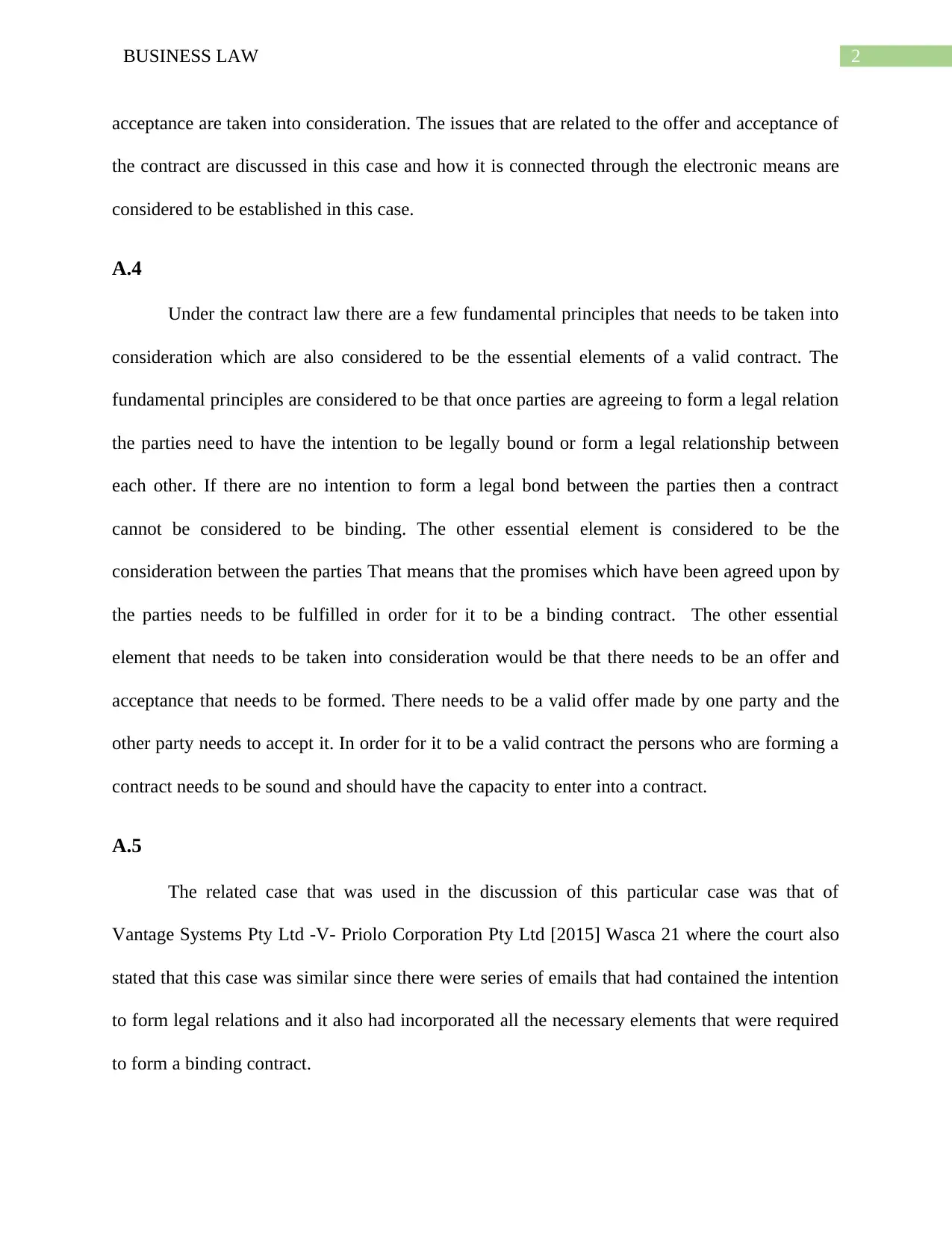
2BUSINESS LAW
acceptance are taken into consideration. The issues that are related to the offer and acceptance of
the contract are discussed in this case and how it is connected through the electronic means are
considered to be established in this case.
A.4
Under the contract law there are a few fundamental principles that needs to be taken into
consideration which are also considered to be the essential elements of a valid contract. The
fundamental principles are considered to be that once parties are agreeing to form a legal relation
the parties need to have the intention to be legally bound or form a legal relationship between
each other. If there are no intention to form a legal bond between the parties then a contract
cannot be considered to be binding. The other essential element is considered to be the
consideration between the parties That means that the promises which have been agreed upon by
the parties needs to be fulfilled in order for it to be a binding contract. The other essential
element that needs to be taken into consideration would be that there needs to be an offer and
acceptance that needs to be formed. There needs to be a valid offer made by one party and the
other party needs to accept it. In order for it to be a valid contract the persons who are forming a
contract needs to be sound and should have the capacity to enter into a contract.
A.5
The related case that was used in the discussion of this particular case was that of
Vantage Systems Pty Ltd -V- Priolo Corporation Pty Ltd [2015] Wasca 21 where the court also
stated that this case was similar since there were series of emails that had contained the intention
to form legal relations and it also had incorporated all the necessary elements that were required
to form a binding contract.
acceptance are taken into consideration. The issues that are related to the offer and acceptance of
the contract are discussed in this case and how it is connected through the electronic means are
considered to be established in this case.
A.4
Under the contract law there are a few fundamental principles that needs to be taken into
consideration which are also considered to be the essential elements of a valid contract. The
fundamental principles are considered to be that once parties are agreeing to form a legal relation
the parties need to have the intention to be legally bound or form a legal relationship between
each other. If there are no intention to form a legal bond between the parties then a contract
cannot be considered to be binding. The other essential element is considered to be the
consideration between the parties That means that the promises which have been agreed upon by
the parties needs to be fulfilled in order for it to be a binding contract. The other essential
element that needs to be taken into consideration would be that there needs to be an offer and
acceptance that needs to be formed. There needs to be a valid offer made by one party and the
other party needs to accept it. In order for it to be a valid contract the persons who are forming a
contract needs to be sound and should have the capacity to enter into a contract.
A.5
The related case that was used in the discussion of this particular case was that of
Vantage Systems Pty Ltd -V- Priolo Corporation Pty Ltd [2015] Wasca 21 where the court also
stated that this case was similar since there were series of emails that had contained the intention
to form legal relations and it also had incorporated all the necessary elements that were required
to form a binding contract.
⊘ This is a preview!⊘
Do you want full access?
Subscribe today to unlock all pages.

Trusted by 1+ million students worldwide
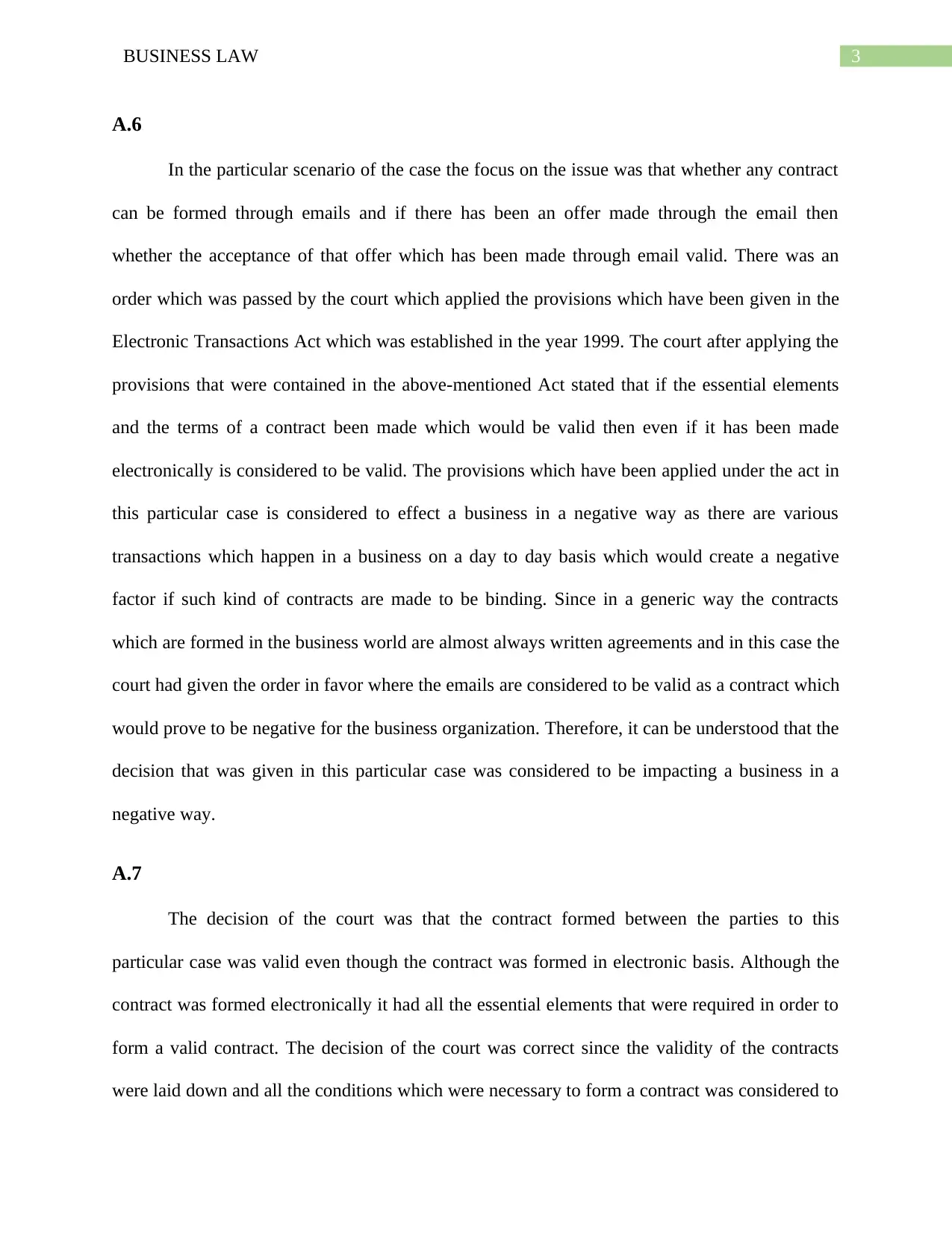
3BUSINESS LAW
A.6
In the particular scenario of the case the focus on the issue was that whether any contract
can be formed through emails and if there has been an offer made through the email then
whether the acceptance of that offer which has been made through email valid. There was an
order which was passed by the court which applied the provisions which have been given in the
Electronic Transactions Act which was established in the year 1999. The court after applying the
provisions that were contained in the above-mentioned Act stated that if the essential elements
and the terms of a contract been made which would be valid then even if it has been made
electronically is considered to be valid. The provisions which have been applied under the act in
this particular case is considered to effect a business in a negative way as there are various
transactions which happen in a business on a day to day basis which would create a negative
factor if such kind of contracts are made to be binding. Since in a generic way the contracts
which are formed in the business world are almost always written agreements and in this case the
court had given the order in favor where the emails are considered to be valid as a contract which
would prove to be negative for the business organization. Therefore, it can be understood that the
decision that was given in this particular case was considered to be impacting a business in a
negative way.
A.7
The decision of the court was that the contract formed between the parties to this
particular case was valid even though the contract was formed in electronic basis. Although the
contract was formed electronically it had all the essential elements that were required in order to
form a valid contract. The decision of the court was correct since the validity of the contracts
were laid down and all the conditions which were necessary to form a contract was considered to
A.6
In the particular scenario of the case the focus on the issue was that whether any contract
can be formed through emails and if there has been an offer made through the email then
whether the acceptance of that offer which has been made through email valid. There was an
order which was passed by the court which applied the provisions which have been given in the
Electronic Transactions Act which was established in the year 1999. The court after applying the
provisions that were contained in the above-mentioned Act stated that if the essential elements
and the terms of a contract been made which would be valid then even if it has been made
electronically is considered to be valid. The provisions which have been applied under the act in
this particular case is considered to effect a business in a negative way as there are various
transactions which happen in a business on a day to day basis which would create a negative
factor if such kind of contracts are made to be binding. Since in a generic way the contracts
which are formed in the business world are almost always written agreements and in this case the
court had given the order in favor where the emails are considered to be valid as a contract which
would prove to be negative for the business organization. Therefore, it can be understood that the
decision that was given in this particular case was considered to be impacting a business in a
negative way.
A.7
The decision of the court was that the contract formed between the parties to this
particular case was valid even though the contract was formed in electronic basis. Although the
contract was formed electronically it had all the essential elements that were required in order to
form a valid contract. The decision of the court was correct since the validity of the contracts
were laid down and all the conditions which were necessary to form a contract was considered to
Paraphrase This Document
Need a fresh take? Get an instant paraphrase of this document with our AI Paraphraser
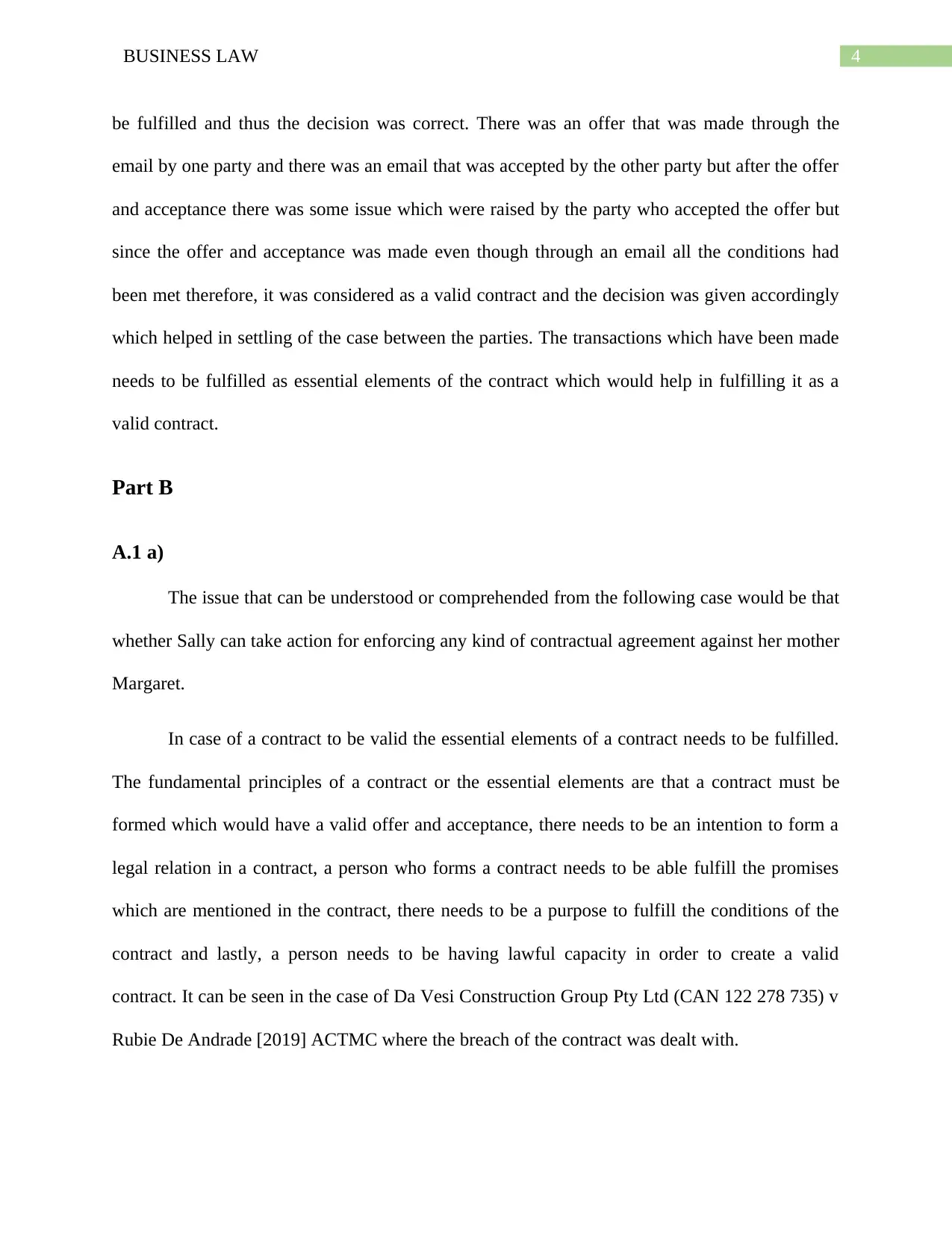
4BUSINESS LAW
be fulfilled and thus the decision was correct. There was an offer that was made through the
email by one party and there was an email that was accepted by the other party but after the offer
and acceptance there was some issue which were raised by the party who accepted the offer but
since the offer and acceptance was made even though through an email all the conditions had
been met therefore, it was considered as a valid contract and the decision was given accordingly
which helped in settling of the case between the parties. The transactions which have been made
needs to be fulfilled as essential elements of the contract which would help in fulfilling it as a
valid contract.
Part B
A.1 a)
The issue that can be understood or comprehended from the following case would be that
whether Sally can take action for enforcing any kind of contractual agreement against her mother
Margaret.
In case of a contract to be valid the essential elements of a contract needs to be fulfilled.
The fundamental principles of a contract or the essential elements are that a contract must be
formed which would have a valid offer and acceptance, there needs to be an intention to form a
legal relation in a contract, a person who forms a contract needs to be able fulfill the promises
which are mentioned in the contract, there needs to be a purpose to fulfill the conditions of the
contract and lastly, a person needs to be having lawful capacity in order to create a valid
contract. It can be seen in the case of Da Vesi Construction Group Pty Ltd (CAN 122 278 735) v
Rubie De Andrade [2019] ACTMC where the breach of the contract was dealt with.
be fulfilled and thus the decision was correct. There was an offer that was made through the
email by one party and there was an email that was accepted by the other party but after the offer
and acceptance there was some issue which were raised by the party who accepted the offer but
since the offer and acceptance was made even though through an email all the conditions had
been met therefore, it was considered as a valid contract and the decision was given accordingly
which helped in settling of the case between the parties. The transactions which have been made
needs to be fulfilled as essential elements of the contract which would help in fulfilling it as a
valid contract.
Part B
A.1 a)
The issue that can be understood or comprehended from the following case would be that
whether Sally can take action for enforcing any kind of contractual agreement against her mother
Margaret.
In case of a contract to be valid the essential elements of a contract needs to be fulfilled.
The fundamental principles of a contract or the essential elements are that a contract must be
formed which would have a valid offer and acceptance, there needs to be an intention to form a
legal relation in a contract, a person who forms a contract needs to be able fulfill the promises
which are mentioned in the contract, there needs to be a purpose to fulfill the conditions of the
contract and lastly, a person needs to be having lawful capacity in order to create a valid
contract. It can be seen in the case of Da Vesi Construction Group Pty Ltd (CAN 122 278 735) v
Rubie De Andrade [2019] ACTMC where the breach of the contract was dealt with.
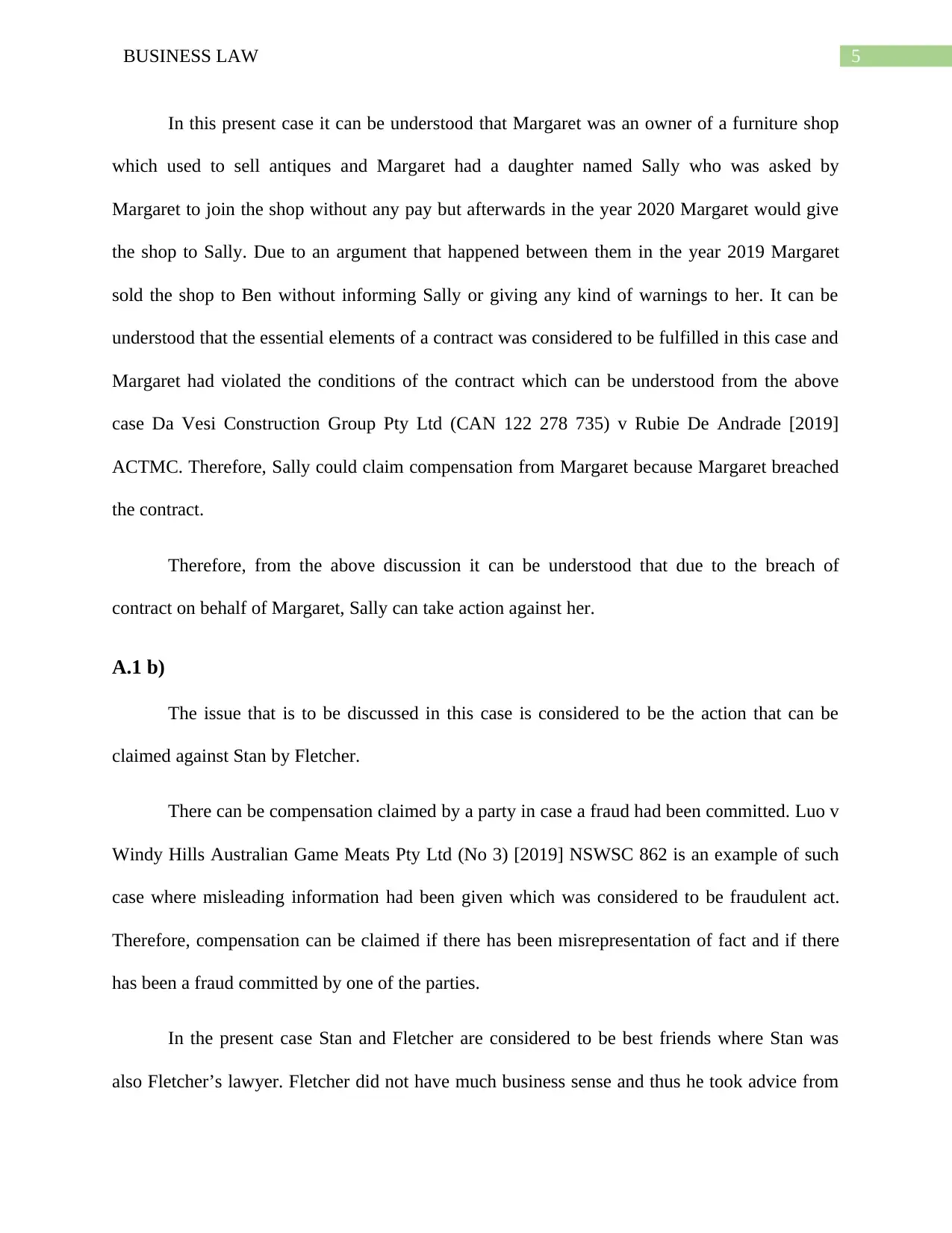
5BUSINESS LAW
In this present case it can be understood that Margaret was an owner of a furniture shop
which used to sell antiques and Margaret had a daughter named Sally who was asked by
Margaret to join the shop without any pay but afterwards in the year 2020 Margaret would give
the shop to Sally. Due to an argument that happened between them in the year 2019 Margaret
sold the shop to Ben without informing Sally or giving any kind of warnings to her. It can be
understood that the essential elements of a contract was considered to be fulfilled in this case and
Margaret had violated the conditions of the contract which can be understood from the above
case Da Vesi Construction Group Pty Ltd (CAN 122 278 735) v Rubie De Andrade [2019]
ACTMC. Therefore, Sally could claim compensation from Margaret because Margaret breached
the contract.
Therefore, from the above discussion it can be understood that due to the breach of
contract on behalf of Margaret, Sally can take action against her.
A.1 b)
The issue that is to be discussed in this case is considered to be the action that can be
claimed against Stan by Fletcher.
There can be compensation claimed by a party in case a fraud had been committed. Luo v
Windy Hills Australian Game Meats Pty Ltd (No 3) [2019] NSWSC 862 is an example of such
case where misleading information had been given which was considered to be fraudulent act.
Therefore, compensation can be claimed if there has been misrepresentation of fact and if there
has been a fraud committed by one of the parties.
In the present case Stan and Fletcher are considered to be best friends where Stan was
also Fletcher’s lawyer. Fletcher did not have much business sense and thus he took advice from
In this present case it can be understood that Margaret was an owner of a furniture shop
which used to sell antiques and Margaret had a daughter named Sally who was asked by
Margaret to join the shop without any pay but afterwards in the year 2020 Margaret would give
the shop to Sally. Due to an argument that happened between them in the year 2019 Margaret
sold the shop to Ben without informing Sally or giving any kind of warnings to her. It can be
understood that the essential elements of a contract was considered to be fulfilled in this case and
Margaret had violated the conditions of the contract which can be understood from the above
case Da Vesi Construction Group Pty Ltd (CAN 122 278 735) v Rubie De Andrade [2019]
ACTMC. Therefore, Sally could claim compensation from Margaret because Margaret breached
the contract.
Therefore, from the above discussion it can be understood that due to the breach of
contract on behalf of Margaret, Sally can take action against her.
A.1 b)
The issue that is to be discussed in this case is considered to be the action that can be
claimed against Stan by Fletcher.
There can be compensation claimed by a party in case a fraud had been committed. Luo v
Windy Hills Australian Game Meats Pty Ltd (No 3) [2019] NSWSC 862 is an example of such
case where misleading information had been given which was considered to be fraudulent act.
Therefore, compensation can be claimed if there has been misrepresentation of fact and if there
has been a fraud committed by one of the parties.
In the present case Stan and Fletcher are considered to be best friends where Stan was
also Fletcher’s lawyer. Fletcher did not have much business sense and thus he took advice from
⊘ This is a preview!⊘
Do you want full access?
Subscribe today to unlock all pages.

Trusted by 1+ million students worldwide
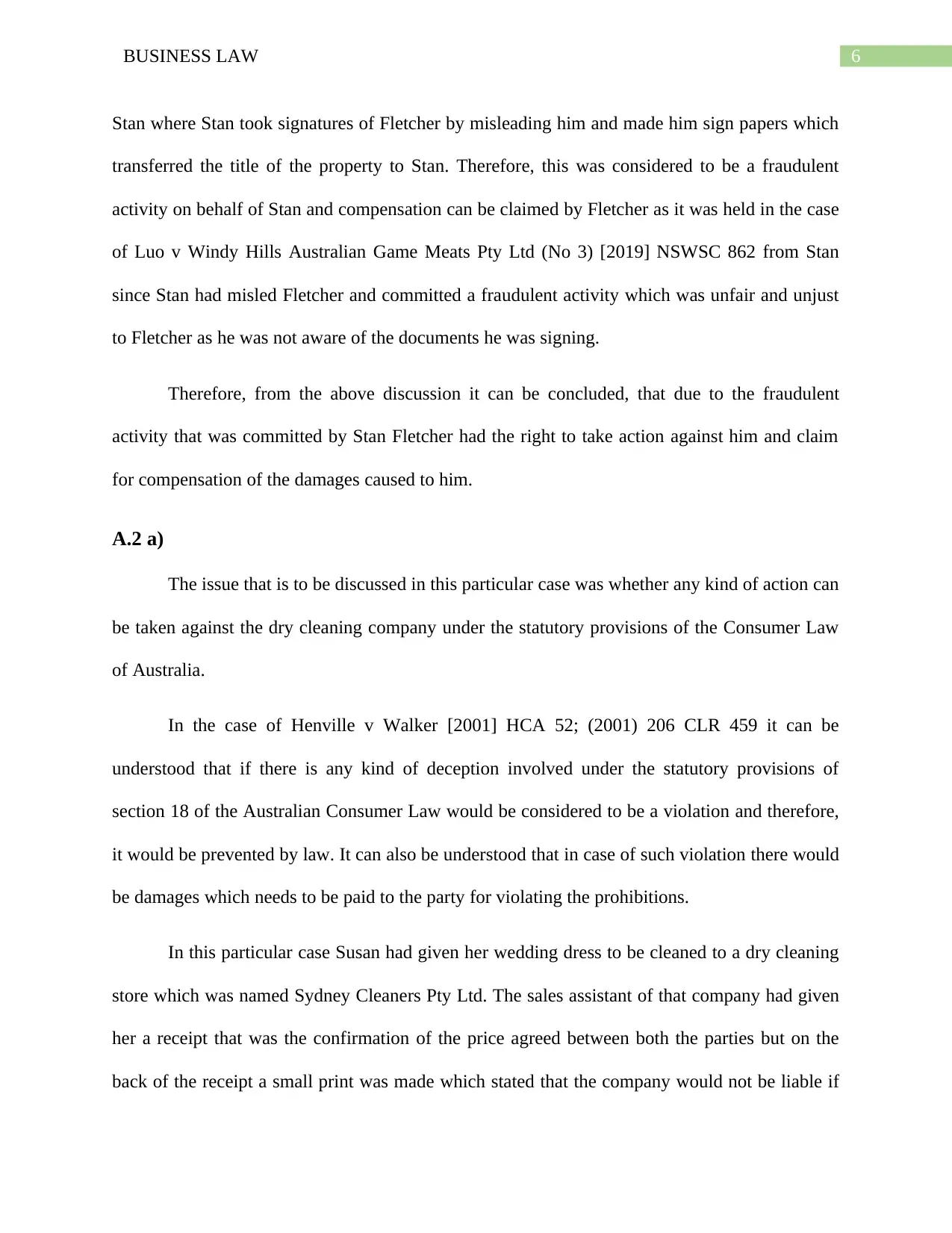
6BUSINESS LAW
Stan where Stan took signatures of Fletcher by misleading him and made him sign papers which
transferred the title of the property to Stan. Therefore, this was considered to be a fraudulent
activity on behalf of Stan and compensation can be claimed by Fletcher as it was held in the case
of Luo v Windy Hills Australian Game Meats Pty Ltd (No 3) [2019] NSWSC 862 from Stan
since Stan had misled Fletcher and committed a fraudulent activity which was unfair and unjust
to Fletcher as he was not aware of the documents he was signing.
Therefore, from the above discussion it can be concluded, that due to the fraudulent
activity that was committed by Stan Fletcher had the right to take action against him and claim
for compensation of the damages caused to him.
A.2 a)
The issue that is to be discussed in this particular case was whether any kind of action can
be taken against the dry cleaning company under the statutory provisions of the Consumer Law
of Australia.
In the case of Henville v Walker [2001] HCA 52; (2001) 206 CLR 459 it can be
understood that if there is any kind of deception involved under the statutory provisions of
section 18 of the Australian Consumer Law would be considered to be a violation and therefore,
it would be prevented by law. It can also be understood that in case of such violation there would
be damages which needs to be paid to the party for violating the prohibitions.
In this particular case Susan had given her wedding dress to be cleaned to a dry cleaning
store which was named Sydney Cleaners Pty Ltd. The sales assistant of that company had given
her a receipt that was the confirmation of the price agreed between both the parties but on the
back of the receipt a small print was made which stated that the company would not be liable if
Stan where Stan took signatures of Fletcher by misleading him and made him sign papers which
transferred the title of the property to Stan. Therefore, this was considered to be a fraudulent
activity on behalf of Stan and compensation can be claimed by Fletcher as it was held in the case
of Luo v Windy Hills Australian Game Meats Pty Ltd (No 3) [2019] NSWSC 862 from Stan
since Stan had misled Fletcher and committed a fraudulent activity which was unfair and unjust
to Fletcher as he was not aware of the documents he was signing.
Therefore, from the above discussion it can be concluded, that due to the fraudulent
activity that was committed by Stan Fletcher had the right to take action against him and claim
for compensation of the damages caused to him.
A.2 a)
The issue that is to be discussed in this particular case was whether any kind of action can
be taken against the dry cleaning company under the statutory provisions of the Consumer Law
of Australia.
In the case of Henville v Walker [2001] HCA 52; (2001) 206 CLR 459 it can be
understood that if there is any kind of deception involved under the statutory provisions of
section 18 of the Australian Consumer Law would be considered to be a violation and therefore,
it would be prevented by law. It can also be understood that in case of such violation there would
be damages which needs to be paid to the party for violating the prohibitions.
In this particular case Susan had given her wedding dress to be cleaned to a dry cleaning
store which was named Sydney Cleaners Pty Ltd. The sales assistant of that company had given
her a receipt that was the confirmation of the price agreed between both the parties but on the
back of the receipt a small print was made which stated that the company would not be liable if
Paraphrase This Document
Need a fresh take? Get an instant paraphrase of this document with our AI Paraphraser
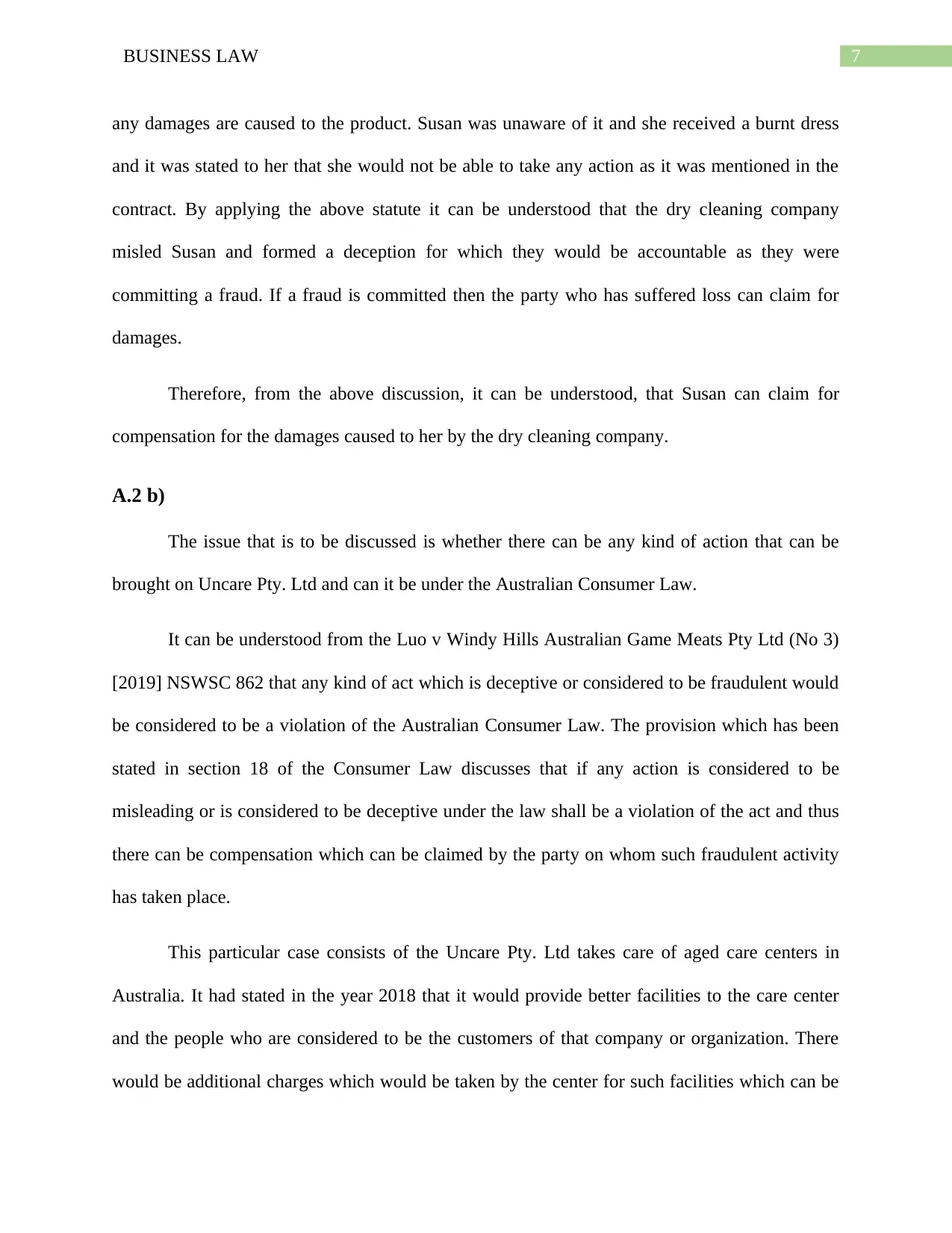
7BUSINESS LAW
any damages are caused to the product. Susan was unaware of it and she received a burnt dress
and it was stated to her that she would not be able to take any action as it was mentioned in the
contract. By applying the above statute it can be understood that the dry cleaning company
misled Susan and formed a deception for which they would be accountable as they were
committing a fraud. If a fraud is committed then the party who has suffered loss can claim for
damages.
Therefore, from the above discussion, it can be understood, that Susan can claim for
compensation for the damages caused to her by the dry cleaning company.
A.2 b)
The issue that is to be discussed is whether there can be any kind of action that can be
brought on Uncare Pty. Ltd and can it be under the Australian Consumer Law.
It can be understood from the Luo v Windy Hills Australian Game Meats Pty Ltd (No 3)
[2019] NSWSC 862 that any kind of act which is deceptive or considered to be fraudulent would
be considered to be a violation of the Australian Consumer Law. The provision which has been
stated in section 18 of the Consumer Law discusses that if any action is considered to be
misleading or is considered to be deceptive under the law shall be a violation of the act and thus
there can be compensation which can be claimed by the party on whom such fraudulent activity
has taken place.
This particular case consists of the Uncare Pty. Ltd takes care of aged care centers in
Australia. It had stated in the year 2018 that it would provide better facilities to the care center
and the people who are considered to be the customers of that company or organization. There
would be additional charges which would be taken by the center for such facilities which can be
any damages are caused to the product. Susan was unaware of it and she received a burnt dress
and it was stated to her that she would not be able to take any action as it was mentioned in the
contract. By applying the above statute it can be understood that the dry cleaning company
misled Susan and formed a deception for which they would be accountable as they were
committing a fraud. If a fraud is committed then the party who has suffered loss can claim for
damages.
Therefore, from the above discussion, it can be understood, that Susan can claim for
compensation for the damages caused to her by the dry cleaning company.
A.2 b)
The issue that is to be discussed is whether there can be any kind of action that can be
brought on Uncare Pty. Ltd and can it be under the Australian Consumer Law.
It can be understood from the Luo v Windy Hills Australian Game Meats Pty Ltd (No 3)
[2019] NSWSC 862 that any kind of act which is deceptive or considered to be fraudulent would
be considered to be a violation of the Australian Consumer Law. The provision which has been
stated in section 18 of the Consumer Law discusses that if any action is considered to be
misleading or is considered to be deceptive under the law shall be a violation of the act and thus
there can be compensation which can be claimed by the party on whom such fraudulent activity
has taken place.
This particular case consists of the Uncare Pty. Ltd takes care of aged care centers in
Australia. It had stated in the year 2018 that it would provide better facilities to the care center
and the people who are considered to be the customers of that company or organization. There
would be additional charges which would be taken by the center for such facilities which can be
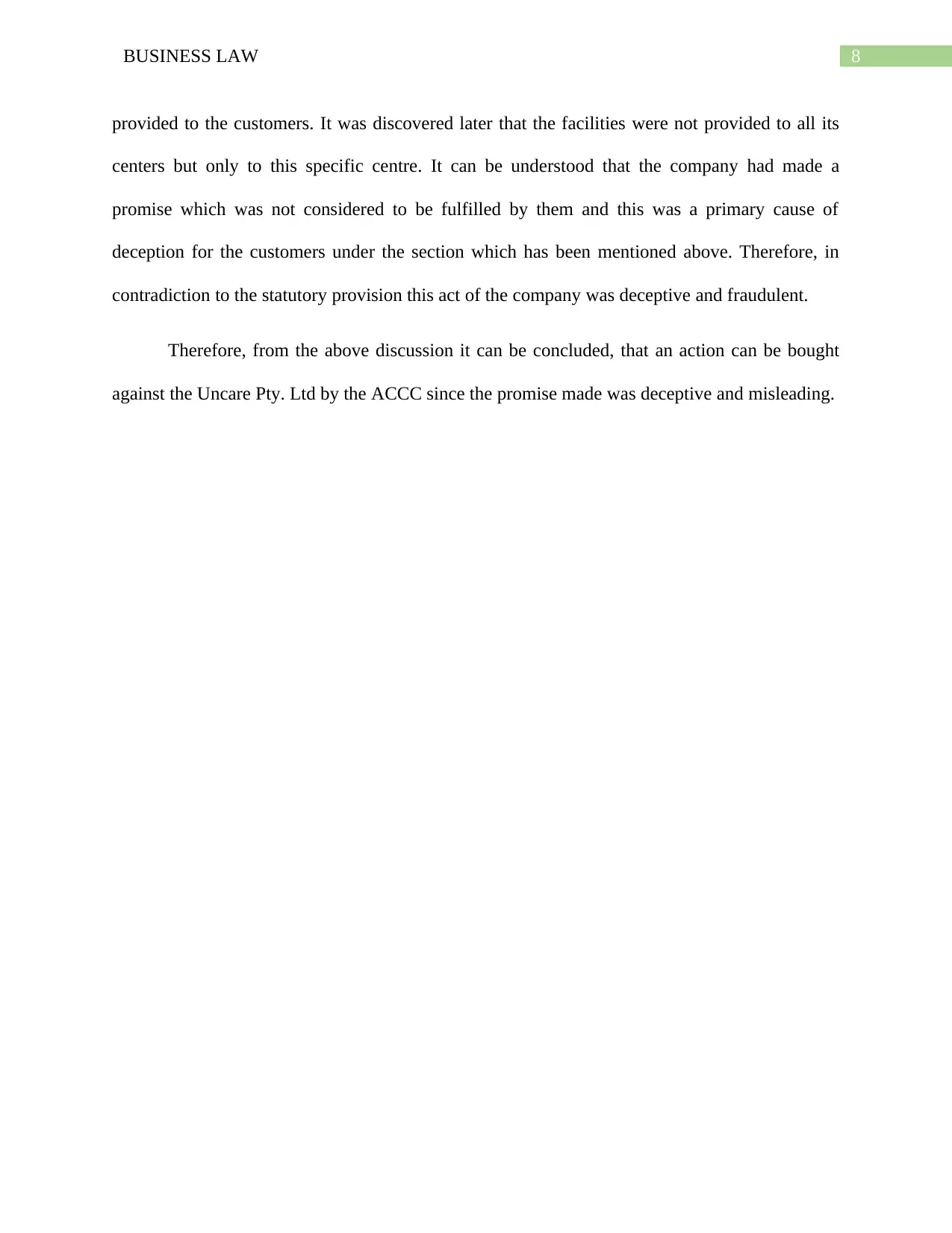
8BUSINESS LAW
provided to the customers. It was discovered later that the facilities were not provided to all its
centers but only to this specific centre. It can be understood that the company had made a
promise which was not considered to be fulfilled by them and this was a primary cause of
deception for the customers under the section which has been mentioned above. Therefore, in
contradiction to the statutory provision this act of the company was deceptive and fraudulent.
Therefore, from the above discussion it can be concluded, that an action can be bought
against the Uncare Pty. Ltd by the ACCC since the promise made was deceptive and misleading.
provided to the customers. It was discovered later that the facilities were not provided to all its
centers but only to this specific centre. It can be understood that the company had made a
promise which was not considered to be fulfilled by them and this was a primary cause of
deception for the customers under the section which has been mentioned above. Therefore, in
contradiction to the statutory provision this act of the company was deceptive and fraudulent.
Therefore, from the above discussion it can be concluded, that an action can be bought
against the Uncare Pty. Ltd by the ACCC since the promise made was deceptive and misleading.
⊘ This is a preview!⊘
Do you want full access?
Subscribe today to unlock all pages.

Trusted by 1+ million students worldwide
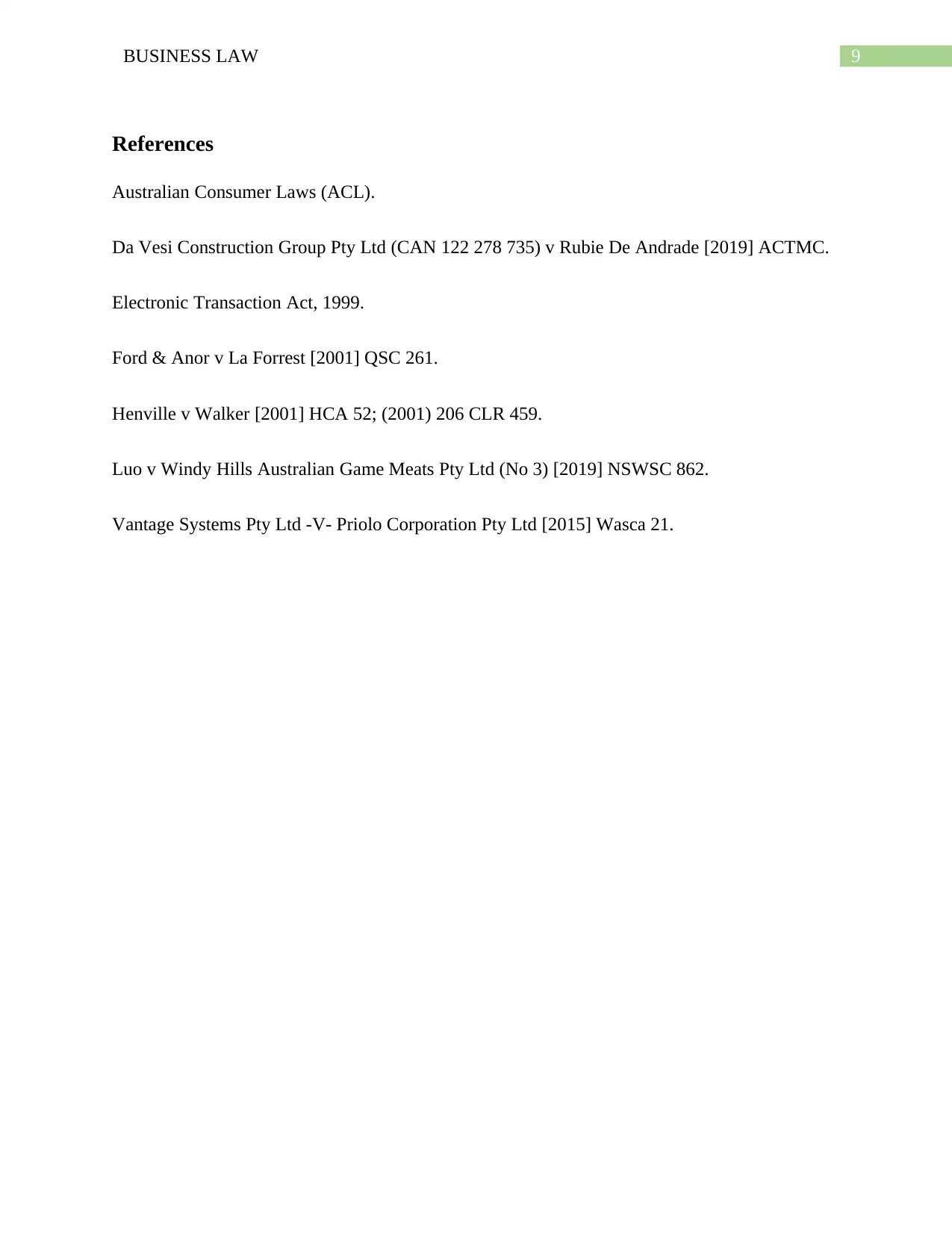
9BUSINESS LAW
References
Australian Consumer Laws (ACL).
Da Vesi Construction Group Pty Ltd (CAN 122 278 735) v Rubie De Andrade [2019] ACTMC.
Electronic Transaction Act, 1999.
Ford & Anor v La Forrest [2001] QSC 261.
Henville v Walker [2001] HCA 52; (2001) 206 CLR 459.
Luo v Windy Hills Australian Game Meats Pty Ltd (No 3) [2019] NSWSC 862.
Vantage Systems Pty Ltd -V- Priolo Corporation Pty Ltd [2015] Wasca 21.
References
Australian Consumer Laws (ACL).
Da Vesi Construction Group Pty Ltd (CAN 122 278 735) v Rubie De Andrade [2019] ACTMC.
Electronic Transaction Act, 1999.
Ford & Anor v La Forrest [2001] QSC 261.
Henville v Walker [2001] HCA 52; (2001) 206 CLR 459.
Luo v Windy Hills Australian Game Meats Pty Ltd (No 3) [2019] NSWSC 862.
Vantage Systems Pty Ltd -V- Priolo Corporation Pty Ltd [2015] Wasca 21.
1 out of 10
Related Documents
Your All-in-One AI-Powered Toolkit for Academic Success.
+13062052269
info@desklib.com
Available 24*7 on WhatsApp / Email
![[object Object]](/_next/static/media/star-bottom.7253800d.svg)
Unlock your academic potential
Copyright © 2020–2026 A2Z Services. All Rights Reserved. Developed and managed by ZUCOL.





